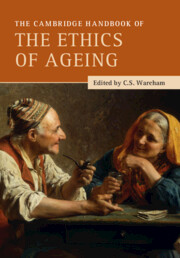Book contents
- The Cambridge Handbook of the Ethics of Ageing
- Cambridge Handbooks in Philosophy
- The Cambridge Handbook of the Ethics of Ageing
- Copyright page
- Contents
- Contributors
- Acknowledgements
- Introduction
- Part I Ageing and the Good Life
- 1 Old Age and the Preference for the Future
- 2 Ageing and the Temporality of the Good Life
- 3 Children’s Prudential Value
- 4 The Ethics of Ageing in Frank Perry’s The Swimmer
- 5 Is Ageing Good?
- 6 Mental Health in Old Age
- 7 In Defense of a Semi-Stoical Attitude about Ageing and Death
- Part II Ageing and Morality
- Part III Ageing and Society
- References
- Index
3 - Children’s Prudential Value
from Part I - Ageing and the Good Life
Published online by Cambridge University Press: 23 August 2022
- The Cambridge Handbook of the Ethics of Ageing
- Cambridge Handbooks in Philosophy
- The Cambridge Handbook of the Ethics of Ageing
- Copyright page
- Contents
- Contributors
- Acknowledgements
- Introduction
- Part I Ageing and the Good Life
- 1 Old Age and the Preference for the Future
- 2 Ageing and the Temporality of the Good Life
- 3 Children’s Prudential Value
- 4 The Ethics of Ageing in Frank Perry’s The Swimmer
- 5 Is Ageing Good?
- 6 Mental Health in Old Age
- 7 In Defense of a Semi-Stoical Attitude about Ageing and Death
- Part II Ageing and Morality
- Part III Ageing and Society
- References
- Index
Summary
This chapter focuses on a cluster of under-explored issues relating to children’s well-being or prudential value. I examine and reject three distinct theses relating to it in the literature on well-being, namely, that children’s lives on the whole cannot go well or poorly for them, prudentially speaking; that the prudential goods of childhood count for less than the prudential goods of adulthood towards the prudential value of an individual’s life as a whole; and that children’s prudential goods are (at least in some cases) in some way special. According to my view, children’s lives can go well or poorly for them, their prudential goods do not count for less than the prudential goods of adulthood, and their basic, non-instrumental prudential goods are not themselves special.
- Type
- Chapter
- Information
- The Cambridge Handbook of the Ethics of Ageing , pp. 38 - 53Publisher: Cambridge University PressPrint publication year: 2022

